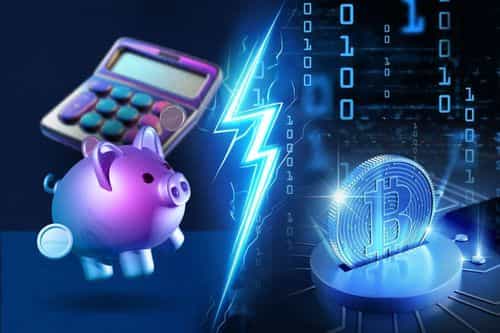Crypto Basics
Begin your journey here. Simplify the terminology, understand the technology, and build a solid foundation in crypto from the ground up.

Token Talk
Get to grips with the difference between coins, tokens, and the terminology that shapes the crypto ecosystem.

How DeFi Coins Work:Mechanisms of Popular Projects
DeFi tokens are often treated as price charts first and system components second. That ordering tends to produce confusion, because most value in DeFi is generated by mechanisms (liquidity, collateral, fees, and governance) rather than by narratives. It may be tempting to assume that “a DeFi coin” behaves like an equity proxy, yet token design is usually closer to access control, parameter steering, and incentive routing. When the underlying mechanism is understood, common behaviors, slippage, sudden APR changes, liquidations, or governance shocks, are less surprising. The full article below is intended to be read end-to-end, because the same mechanism often reappears as both a feature and a risk surface.

DeFi Coins to Watch as 2025 Ends
The decentralized finance (DeFi) space continues to revolutionize traditional finance with innovative solutions, enabling individuals to borrow, lend, trade, and earn interest without intermediaries. With the market maturing, DeFi coins are emerging as a critical aspect of the cryptocurrency ecosystem, with their promising growth in 2025. As a DeFi enthusiast, choosing the right DeFi coins can be the key to maximizing returns. Below are the top 5 DeFi coins to watch and follow.

How on-chain price impacts NFT valuation?
On-chain data turns NFT valuation from guesswork into measurement. Every bid, sale, and transfer is recorded on a public ledger, enabling price indices, liquidity ratios, and risk screens that weren’t possible in traditional art markets. In practice, on-chain price signals liquidity depth and confidence, while revealing manipulation and demand cycles. Academic and market research now shows price, volume, and liquidity form the core triangle of NFT value formation. To know more about blockchain’s role in pricing and its transparent benefits, read the article below!

Stablecoins & Market Volatility
In recent years, stablecoins have garnered significant attention in the cryptocurrency and financial markets due to their potential to stabilize the inherently volatile crypto environment. These digital currencies, pegged to traditional assets such as the U.S. dollar or other commodities, play a crucial role in maintaining price stability for traders and investors. However, despite their apparent stability, the impact of stablecoins on overall market volatility is still widely debated. In this article, we’ll explore the functioning of stablecoins, their potential benefits in reducing market fluctuations, and the challenges they face in maintaining their stability.

What Are DeFi Coins?
Decentralised Finance (DeFi) has revolutionised the cryptocurrency world, offering a new way for individuals to engage in financial services such as lending, borrowing, and trading, without relying on traditional banks or intermediaries. At the heart of the DeFi ecosystem are DeFi coins, cryptocurrencies designed to power decentralized platforms and services. But what exactly are DeFi coins, and how do they differ from traditional cryptocurrencies? In this article, we will dive deep into the world of DeFi coins, including their role, use cases, popular tokens, and how to interact with them securely. Whether you’re new to DeFi or looking to deepen your understanding, this comprehensive guide will provide you with everything you need to know.

Crypto Swaps Change Trading World
Cryptocurrency trading is evolving at lightning speed, and one of the most exciting innovations shaking things up right now is crypto swaps. These swaps enable users to trade various cryptocurrencies without relying on traditional exchanges, creating a more decentralized and efficient trading environment. In this article, we’ll explore the different types of crypto swaps, their benefits and risks, and how they’re influencing the future of Decentralized Finance (DeFi). By understanding these swaps, traders can unlock new opportunities and navigate the complex world of crypto trading with greater confidence.

What Are DEX Tokens?
As the crypto market matures, decentralized finance (DeFi) is becoming a dominant force, offering more control, transparency, and innovation than traditional financial systems. At the heart of DeFi lie decentralized exchanges (DEXs), platforms that allow peer-to-peer crypto trading without intermediaries. But what powers these platforms? Enter DEX tokens, crypto assets that are traded and used to govern, incentivize, and enhance the entire DEX experience. In this article, we’ll explore what DEX tokens are, how they differ from other cryptocurrencies, and why they are crucial in today’s decentralized ecosystem. From earning rewards to influencing protocol decisions, DEX tokens have evolved into powerful tools that go far beyond simple digital currency.

Bitcoin Prices & Global Events
Global events have a notable impact on Bitcoin, the world’s most recognized cryptocurrency. When financial markets face uncertainty or major geopolitical shifts occur, Bitcoin price trends often move dramatically. This article explores how global events affect Bitcoin prices, emphasizing factors such as economic crises, regulatory changes, and geopolitical developments that drive Bitcoin market volatility.

ERC-20 vs BEP-20 tokens:key utilities and features
Understanding token standards is essential for interacting with different blockchain networks. Two of the most widely used token standards are ERC-20 and BEP-20. Both are foundational to decentralized finance (DeFi) and the broader crypto ecosystem. If you're new to tokens or are exploring DeFi, this article will help you understand what ERC-20 and BEP-20 tokens are, how they work, and the key differences between them.

Crypto-to-crypto swap explained
Crypto users are always looking for platforms that offer the best prices and lowest fees for exchanging cryptocurrencies. This process, known as a crypto swap, is essential for anyone looking to trade, stake, or interact with decentralized applications (dApps) in the DeFi ecosystem. Rango Exchange stands out as a No KYC bridge and DEX aggregator, offering competitive swap rates and access to huge aggregated DeFi liquidity, making it the ideal platform for crypto-to-crypto exchanges.

Ethereum token swap tutorial: learn Ethereum and its crypto exchange basics
Ethereum is one of the core blockchains among cryptocurrency ecosystems, it is important to generally learn it and get to know its basic operations. One of its main operations is token swaps which every crypto trader or inverstor needs to master it. Learn what is crypto exchange swapping on Ethereum; how prices and fees are calculated.
Meme coins
Meme coins are one of the current market bold trends, risky assets that mostly are based on social narratives or prominent figures. Learn to invest and trade wiser.
Block by Block
Dive into the world of blockchain and discover how this revolutionary technology powers cryptocurrencies and beyond.

Top Blockchain Explorers You Should Know About
By 2025, a growing share of digital asset activity is being verified directly on-chain, and it is increasingly being recognized that this verification depends on a small set of reliable blockchain explorers. These tools are often treated as simple “block search engines,” yet it is through them that balances are checked, fees are validated, and suspicious contracts are first inspected. As more capital moves across Ethereum, BNB Smart Chain, Solana, and other networks, the choice of explorer can meaningfully affect clarity and risk exposure. For that reason, it is recommended that the full article below be reviewed before high-value transactions are initiated.

Top Blockchain Innovations Driving Market Growth
Blockchain is shifting from novelty to infrastructure where auditability, programmable settlement, and interoperability matter. Adoption tracks real constraints, latency, compliance, and recoverability, rather than speculation. Gains come from rollups + data-availability cutting costs, smart contracts automating routine tasks, and identity/provenance checks without excess disclosure. Tokenized real-world assets move ahead under clearer rules, while supply-chain and healthcare rely on verifiable records, the sections below unpack trends, trade-offs, and safeguards.

Proof of Work vs. Proof of Stake: Key Differences
In 2026, the proof of work vs proof of stake discussion is less about ideology and more about operational trade-offs that show up in real workflows: exchange deposits, bridge finality windows, validator concentration, and the cost of a failed reorg-sensitive transaction. It may be tempting to assume that one model is simply “old and wasteful” while the other is “new and efficient,” yet the observed reality has been more nuanced, especially when DEX aggregators, cross-chain swaps, and on-chain bridges are involved. The article below can be read as a practical day-to-day crypto usage and system design.

A Deep Dive into Blockchain: Key Concepts
Blockchains do more than store data! they create trust by changing the way value travels, the way records stay safe and the way people join the system. In this deep dive you will learn the three core building blocks: decentralization, transparency, immutability. See how public, private, and consortium networks differ, and learn why smart contracts cut costs while boosting efficiency. We'll ground concepts about finance, supply chains and healthcare. When you finish you will know where blockchain belongs, which tasks it handles well as well as how to judge its value for your own plan.

Modular blockchains review
Blockchain is shifting from monolithic to modular architectures, addressing scalability, security, and decentralization challenges. This article explores how modular blockchains separate core functions, execution, settlement, consensus, and data availability, into specialized layers. Learn about key technologies like rollups and data availability layers, and understand their impact on blockchain interoperability. Plus, discover how platforms like Rango Exchange enable seamless cross-chain experiences in this new era.

UTXO vs. Account-Based Models
Cash or bank! your crypto has to choose. Behind every transaction lie two rival models: UTXO, which thinks in discrete “bills” you spend and replace, and account-based, which keeps a living global balance sheet. Those design choices ripple into everything you feel on-chain, fees, privacy, scalability, and the very shape of smart contracts. This guide demystifies both philosophies and shows how Rango stitches them together for seamless any-to-any swaps across chains.

Guide to Right Blockchain Course
Blockchain isn’t just a buzzword anymore! Whether you're looking to build smart contracts, manage crypto assets, or lead blockchain strategy in your organization, choosing the right blockchain course is the first step. With hundreds of programs available, from free tutorials to Ivy League certifications, this guide helps you cut through the noise and find the blockchain education that matches your goals, skill level, and career path.

Blockchain News Impact on Prices & Trends
In the dynamic world of cryptocurrency, news events play a pivotal role in shaping market sentiment and triggering rapid price shifts. From technological breakthroughs to regulatory crackdowns, the crypto market is hypersensitive to the flow of information. Even a single tweet from a notable figure or a policy change can send ripples or waves through the market. Understanding how blockchain news impacts crypto prices and market trends is not just helpful, it's essential for any serious investor or trader.

Blockchain, the Future of Internet Privacy
Internet privacy has become paramount in an era where digital footprints are meticulously tracked and personal data is commodified. Traditional centralized systems often leave users vulnerable to data breaches and unauthorized surveillance. Enter blockchain technology, a decentralized framework promising enhanced security, transparency, and user autonomy. But can blockchain truly redefine the landscape of internet privacy?

Blockchain for Beginners
Blockchain is one of the most revolutionary technologies of the 21st century. It’s changing how we handle money through digital currencies like Bitcoin and creating new ways to build trust online without relying on traditional middlemen. This technology quickly reshapes industries such as finance, supply chains, healthcare, and more by providing secure and transparent record-keeping. If you’re new to blockchain, this guide will help you understand the basics in simple and practical terms, so you can see how it’s impacting the world around us.

Top Blockchain News Sources
In the rapidly evolving world of blockchain and cryptocurrencies, staying informed is not just helpful, it's essential. With the constant stream of innovations, regulations, and market shifts, reliable information helps users make educated decisions and avoid being misled by hype or misinformation. The blockchain space is filled with noise, so distinguishing fact from fiction is crucial for both retail investors and industry professionals. This guide introduces the top 10 most trustworthy blockchain news platforms and the criteria that make them stand out in a crowded media environment.

What Is On-Chain Data?
In the world of blockchain technology, there’s a lot of talk about what happens “on-chain” versus “off-chain.” But if you’re wondering what on-chain data means in blockchain, you’re not alone. It’s one of those essential concepts that underpins the transparency, security, and decentralization that blockchains promise. Let’s break it down and explore why on-chain data is a game-changer, and where it’s already making an impact.

Top 10 Blockchain Applications
Blockchain technology, once primarily linked with cryptocurrencies like Bitcoin, is now rapidly transforming a wide range of industries. At its core, blockchain offers a decentralized, secure, and transparent method of managing transactions and data. Beyond finance, its potential is reshaping sectors such as healthcare, supply chains, voting systems, and cybersecurity. Let’s explore how blockchain is revolutionizing industries globally.

Understanding blockchain layers: L1 vs L2
As blockchain networks grow, scalability becomes a key challenge. To address this, two primary blockchain layers have emerged: Layer 1 (L1) and Layer 2 (L2). Layer 1 serves as the base infrastructure where transactions are validated and secured, while Layer 2 solutions build on L1 to enhance scalability, reduce costs, and increase transaction speeds. This article explores the differences between L1 and L2, how they work together, and the future trends in blockchain scaling.

How blockchain technology works?
Blockchain technology is more than just the foundation of cryptocurrencies—it’s a transformative innovation reshaping industries worldwide. By offering a decentralized, secure, and transparent way to record transactions, blockchain eliminates the need for intermediaries, enhances trust, and enables a new era of digital collaboration. Whether you're new to blockchain or looking to deepen your understanding, this guide breaks down its key principles, how it functions, and why it matters in today’s digital world.
Frequently asked questions
Check out most commonly asked questions, addressed based on community needs. Can't find what you are looking for?
Contact us, our friendly support helps!
What is cryptocurrency?
Cryptocurrency is a digital or virtual form of money that uses cryptography for security. It operates on decentralized networks, typically based on blockchain technology, making it resistant to control or manipulation by governments or central banks.
How do cryptocurrencies work?
Cryptocurrencies work through blockchain technology, which is a distributed ledger that records transactions across a network of computers. Transactions are verified by network participants (miners or validators) using cryptographic techniques, ensuring security and transparency.
What are the most famous cryptocurrencies?
The most famous cryptocurrencies include Bitcoin (BTC), Ethereum (ETH), Binance Coin (BNB), Ripple (XRP), and Litecoin (LTC). Each has its unique features, with Bitcoin being the first and most well-known, and Ethereum supporting decentralized applications and smart contracts.

